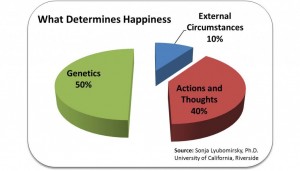We all want to be happy. It’s natural. It’s on the top of all of our lists, no matter where in the world we live. It’s a good aim.
But many of us aren’t happy are we. And we chase after many things in life in search of it. Heck, there’s even an entire emerging branch of psychology (positive psychology) that has been coined out of the search of happiness and taking a proactive approach to fostering positive qualities in individuals.
The problem though isn’t in determining what we want, but more in figuring out how we go about attaining it.
What do we change? What will make us happy? How do we attain it?
Here’s a few interesting keys and truths around happiness to help you.
* Many things contribute to make us happy
Sonja Lyubomirsky is a professor in the Department of Psychology at the University of California. She and her colleagues have done a lot of research into what makes us happy and strategies that can be used to increase happiness. (Sonja Lyubomirsky, David Schkade and Kennon M. Sheldon, “Pursuing Happiness: The Architecture of Sustainable Change“, 2005). According to this research, 50% of our happiness is genetically determined, 10% is determined by life’s circumstances and the remaining 40% is determined by our intentional activity ie what we think and what we do.
That a large part of our happiness is genetic is intriguing I know. (See this article in Forbes magazine for research done around studying identical twins where the common genetic factors played a large part in their happiness, not just the environmental differences in their lives. Or read more about the ‘happiness gene’ as described in this newspaper article). I guess though, that if genetic factors play a role in someone’s intelligence or athletic prowess, then it is not a stretch to believe that a happy disposition can be genetically predetermined.
But more importantly, let’s focus on the fact that a number of factors contribute to whether we’re happy or not. And
* Happiness is not just about material possessions or conditions
If you assume the above research is true, then what is means is that all that happiness that we seek through material possessions (the better car, bigger house, more money, the new pair of shoes, that new TV etc.) or through our external circumstances and conditions will only make a small difference in our reported levels of well being and life satisfaction (Lyubomirsky, 2007). Far less than what we’ve been led to believe.
It means if you were rich, had the perfect mate, and were in terrific health, you would only be 10% happier than if you were poor, single, and in bad shape physically.
Surely that can’t be true? Are you telling me that I wouldn’t be happier after becoming a millionaire? Well, research proves otherwise. According to studies of lottery winners (see this article), as well as people who became paraplegics from an accident (see here), both groups returned to their previous level of happiness within less than a year. Or see this well known study where Masai herdsmen rated themselves and had the same happiness as the Forbes 400 richest Americans – see details here). Money wont buy you happiness. And most negative life experiences likewise have only a small impact on long-term satisfaction.
Do you see the point? If you’re already miserable, your misery will continue even if you become a millionaire but if you’re happy in general, even upon becoming a paraplegic, you’ll eventually return to happiness after an adaptation phase. We spend our lives trying to change our conditions in order to be happy, without realizing that it’s not working.
* Following your dreams / goals is good, but stop and think about the point of your goals
Instead of putting almost all of your energy into chasing things that only slightly improve your happiness, put your energy into that portion of happiness (40 %) that is in your control (what you do and what you think), and learn to harness it’s potential to bring about a happier life.
Conclusion
A number of factors contribute to our happiness. But clearly not the ones we think or that we spend most of our energy on.
Like me, you’re probably surprised that your genetics play such a big part in your level of happiness. But that is not the point – don’t be a slave to your genetic set point – anything can be improved. Just as you can learn more and become more intelligent, or lift more and get stronger – you’re capable of greater, more meaningful, happiness.
So put less focus on material possessions and your external circumstances (which don’t massively affect your level of happiness) and put more focus on your internal thoughts and intentions which make a bigger difference to your happiness (and are also most within your control). Find and use strategies to increase your happiness (exercise gratitude, enjoy pleasurable activities, improve your stress management skills, manage and harness your thoughts, make sure you are striving after the right goals for the right reasons etc).
And even if you never win the award for ‘Happiest Person on the Planet’, deepening your experience of happiness is reward enough !!!





Leave A Comment